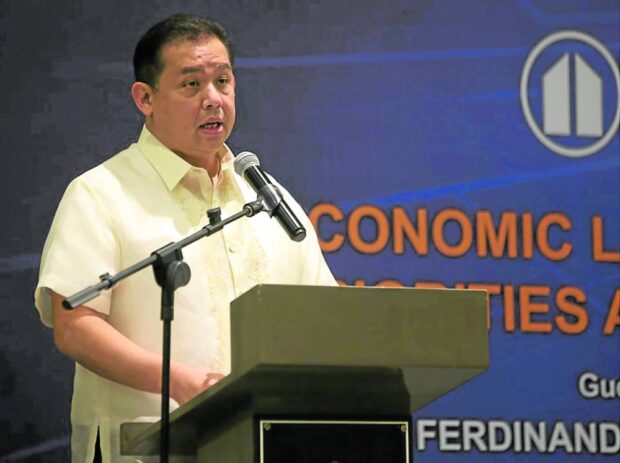
House Speaker Martin Romualdez (File photo from Martin Romualdez FB page)
MANILA, Philippines — House Speaker Ferdinand Martin Romualdez has expressed support for President Ferdinand “Bongbong” Marcos Jr.’s push for nuclear energy, saying that the country needs to develop cheaper and alternative sources to bring power prices down.
Romualdez, in a statement on Tuesday, said that Marcos’ trip to the United States yielded a positive development for the energy sector, as the Chief Executive met with an American nuclear energy firm.
The Speaker said this after he, Marcos, and other Philippine government officials met with Oregon-based NuScale Power Corporation, which has expressed interest in investing in the country.
“This positive development proves the unrelenting commitment of President Marcos to fulfill his promise to the Filipino people of ensuring the availability of cheap and reliable energy,” Romualdez, who is part of Marcos’ delegation, said in a statement.
“Adequate and cheaper energy source of power is crucial to sustaining our robust economic growth. But the President is very much aware that building additional energy generation capacity takes years to accomplish, and it is prudent that we should continuously explore alternatives—including the use of nuclear power—to achieve this goal,” he added.
NuScale offers the small modular reactor technology (SMR), which according to the International Atomic Energy Agency (IAEA), are “advanced nuclear reactors that have a power capacity of up to 300 MW (megawatts)(e) per unit”.
IAEA said this type of nuclear reactor is best for areas where large and conventional nuclear reactors are not suitable due to geographical limitations. Construction of the SMR also does not have to be done on-site, as these can be shipped to a particular location instead, unlike large reactors.
In the Philippines, the Department of Science and Technology’s Philippine Nuclear Research Institute (PNRI) raised the possibility of SMRs being used in the country due to the practicality of reactors that are pre-constructed already.
Since construction would not be a problem, PNRI said this would be good for off-grid or hard-to-reach areas.
READ: PH eyes use of small nuclear reactors for power generation
Romualdez said that they in the House of Representatives are also working towards integrating nuclear energy in the country’s energy mix, as a House panel had already approved proposals for a more comprehensive atomic regulation framework.
“On our end at the House of Representatives, we are working hard to pass measures that would provide the necessary legal framework and policies to encourage the development of alternative power sources in support of the President’s vision for our nation’s energy security,” he added.
Aside from nuclear energy, Romualdez assured the public that they are looking at other sources, highlighting that the House has already approved the Waste-to-Energy Bill, and are deliberating measures that push for clean and renewable energy, such as solar or wind power.
Initially, the Presidential Communications Office (PCO) announced that NuScale may invest around $6.5 billion to $7.5 billion in the country, providing around 430MW of power to the country by 2031.
PCO later clarified that the figures were estimates from NuScale’s local partner Prime Infrastructure Capital, Inc., which said that the “future investment value of the project would be in the range” of $6.5 billion to $7.5 billion.
Marcos in his meeting with NuScale, PCO said, took note of the country’s shortfall in the power supply.
READ: Palace: US nuclear power firm keen on investing in PH
This is not the first time that Marcos met with NuScale officials. On the sidelines of the 77th United Nations General Assembly in New York last September, the two sides met to discuss possible partnerships to address the Philippines’ power woes.

